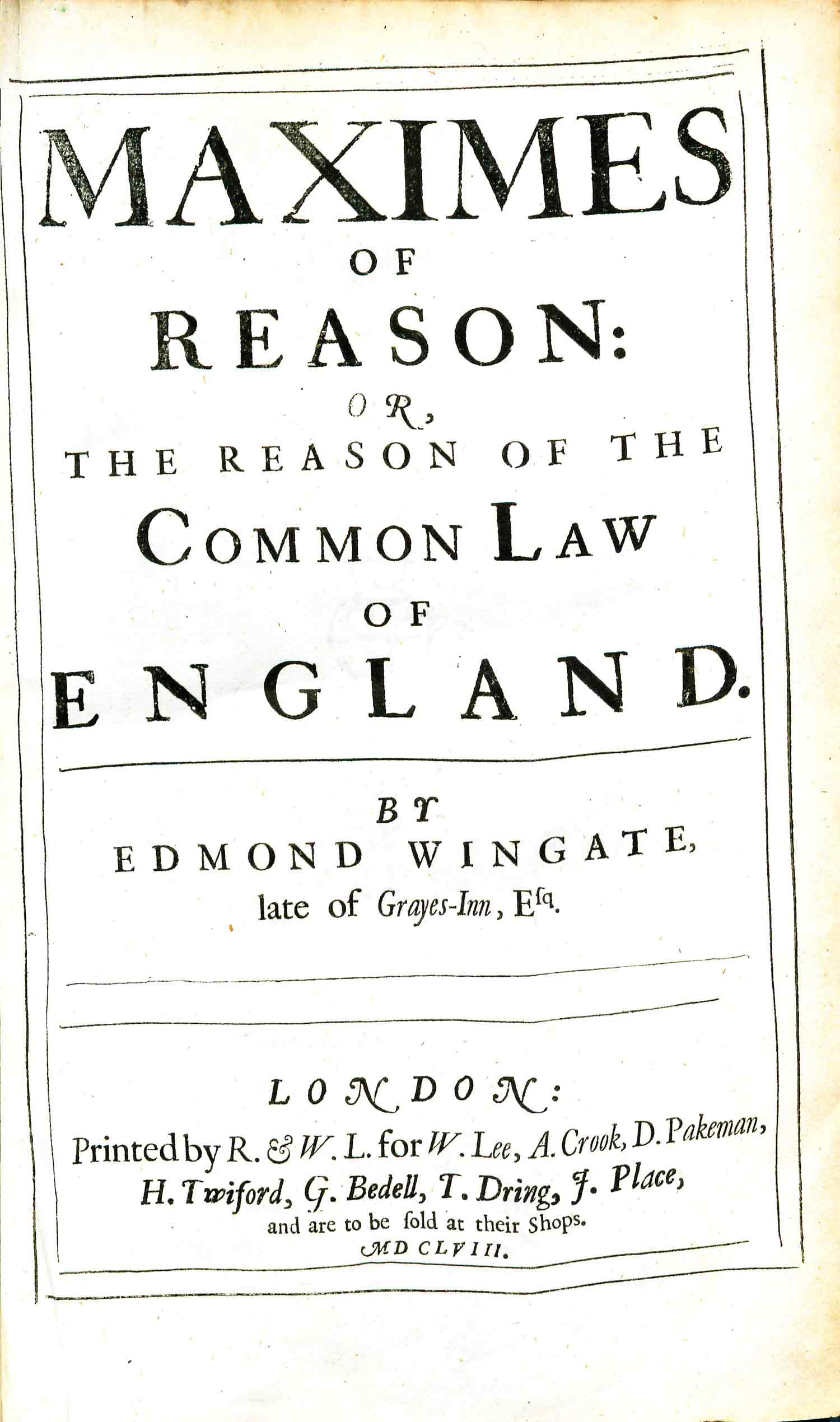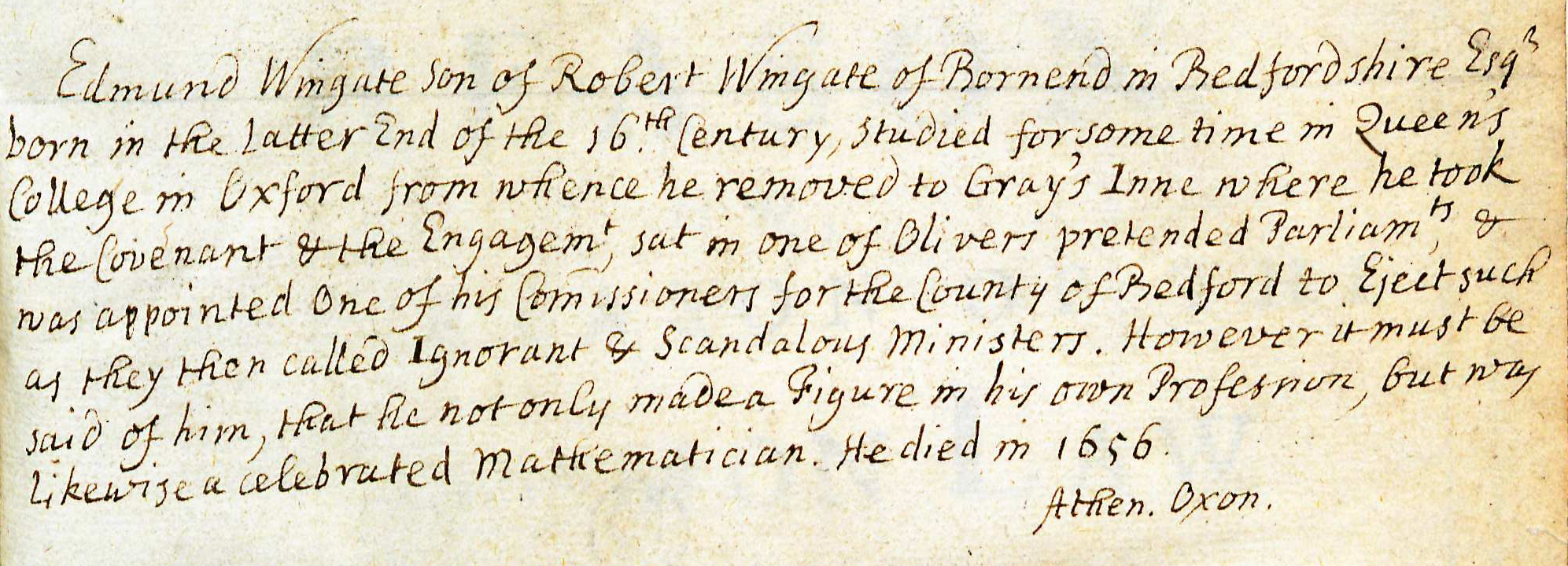Difference between revisions of "Maximes of Reason"
Mvanwicklin (talk | contribs) m |
|||
| Line 6: | Line 6: | ||
|link=http://wm-primo.hosted.exlibrisgroup.com/01COWM_WM:EVERYTHING:01COWM_WM_ALMA21534419600003196 | |link=http://wm-primo.hosted.exlibrisgroup.com/01COWM_WM:EVERYTHING:01COWM_WM_ALMA21534419600003196 | ||
|shorttitle=Maximes of Reason | |shorttitle=Maximes of Reason | ||
| − | |author=Edmund Wingate | + | |author=[[:Category:Edmund Wingate|Edmund Wingate]] |
| − | |publoc=London | + | |publoc=[[:Category:London|London]] |
|publisher=Printed by R. & W. L. for W. Lee, A. Crook, D. Pakeman, H. Twiford, G. Bedell, T. Dring, J. Place | |publisher=Printed by R. & W. L. for W. Lee, A. Crook, D. Pakeman, H. Twiford, G. Bedell, T. Dring, J. Place | ||
|year=1658 | |year=1658 | ||
|edition=First | |edition=First | ||
| − | |lang=English | + | |lang=[[:Category:English|English]] |
|pages=[16], 772, (i. e. 720), [12] | |pages=[16], 772, (i. e. 720), [12] | ||
| − | |desc=Folio (29 cm.) | + | |desc=[[:Category:Folios|Folio]] (29 cm.) |
|shelf=F-1 | |shelf=F-1 | ||
}}[http://en.wikipedia.org/wiki/Edmund_Wingate Edmund Wingate] (1596-1656) wrote popular and important works about mathematics, such as ''The Use of the Rule of Proportion''. Later in life he studied law, and wrote several books in this field.<ref>Bertha Porter, "[http://www.oxforddnb.com.proxy.wm.edu/view/article/29732 Wingate, Edmund (bap. 1596, d. 1656)]," rev. H. K. Higton, in ''Oxford Dictionary of National Biography'', accessed October 12, 2013.</ref><br /> | }}[http://en.wikipedia.org/wiki/Edmund_Wingate Edmund Wingate] (1596-1656) wrote popular and important works about mathematics, such as ''The Use of the Rule of Proportion''. Later in life he studied law, and wrote several books in this field.<ref>Bertha Porter, "[http://www.oxforddnb.com.proxy.wm.edu/view/article/29732 Wingate, Edmund (bap. 1596, d. 1656)]," rev. H. K. Higton, in ''Oxford Dictionary of National Biography'', accessed October 12, 2013.</ref><br /> | ||
| Line 41: | Line 41: | ||
Read this book in [http://books.google.com/books?id=LA4yAAAAIAAJ&printsec=frontcover Google Books.] | Read this book in [http://books.google.com/books?id=LA4yAAAAIAAJ&printsec=frontcover Google Books.] | ||
| + | [[Category:Edmund Wingate]] | ||
[[Category:Dabney Carr's Books]] | [[Category:Dabney Carr's Books]] | ||
[[Category:English Law]] | [[Category:English Law]] | ||
[[Category:George Wythe Collection at William & Mary's Wolf Law Library]] | [[Category:George Wythe Collection at William & Mary's Wolf Law Library]] | ||
[[Category:Titles in Wythe's Library]] | [[Category:Titles in Wythe's Library]] | ||
| + | |||
| + | [[Catgory:English]] | ||
| + | [[Category:Folios]] | ||
| + | [[Category:London]] | ||
Revision as of 13:34, 19 June 2018
by Edmund Wingate
| Maximes of Reason | |
|
Title page from Maximes of Reason, George Wythe Collection, Wolf Law Library, College of William & Mary. | |
| Author | Edmund Wingate |
| Published | London: Printed by R. & W. L. for W. Lee, A. Crook, D. Pakeman, H. Twiford, G. Bedell, T. Dring, J. Place |
| Date | 1658 |
| Edition | First |
| Language | English |
| Pages | [16], 772, (i. e. 720), [12] |
| Desc. | Folio (29 cm.) |
| Location | Shelf F-1 |
Edmund Wingate (1596-1656) wrote popular and important works about mathematics, such as The Use of the Rule of Proportion. Later in life he studied law, and wrote several books in this field.[1]
In Maximes of Reason or, The Reason of the Common Law of England, Wingate compiles and comments on 214 legal maxims.[2] At the time, Wingate had a legal theory which stated:
Not all Laws that are Just and Prudent ought to be used as Radii and Effluxes from the Eternal Wisdom, having thus Exemplar Cause and bright Idea in God himself. The mediate Author of these is humane Reason, exalted and purified by Learning and Experience, and enlightened by the Divine Spirit; I presume there is no fear of Sofinians in Law, and that attempts may be made without charges, to discover how the vast multitude of Cases, that Follies, or Passions, or Necessities of men have obliged us to be acquainted with, are all accountable and redouble to some few Theses; which being prime Emanations and General Maximes of Reason, govern and serve for a Clue and Conduct, through the Labyrinth of that perplex variety; Saving us the labour of Chargeing our memories with every particle, then to burden and confound us.[3]
Evidence for Inclusion in Wythe's Library
Listed in the Jefferson Inventory of Wythe's Library as Wingate's Maxims, fol. and given by Thomas Jefferson to Dabney Carr. The 1658 edition appears to be the only edition published.[4] Accordingly, both the Brown Bibliography[5] and George Wythe's Library[6] on LibraryThing include the 1658 edition. The Wolf Law Library moved a copy of the same edition from another rare book collection to the George Wythe Collection.
Description of the Wolf Law Library's copy
Recently rebound in period style. Spine features four bands with gilt rules with green label. Purchased through the generosity of Daniel W. Baran and Lena Stratton Baran, Class of 1936.
Images of the library's copy of this book are available on Flickr. View the record for this book in William & Mary's online catalog.
See also
References
- ↑ Bertha Porter, "Wingate, Edmund (bap. 1596, d. 1656)," rev. H. K. Higton, in Oxford Dictionary of National Biography, accessed October 12, 2013.
- ↑ Roscoe Pound, "The Maxims of Equity. I of Maxims Generally," Harvard Law Review 34, no. 8 (1921): 834.
- ↑ A.W.B. Simpson, "The Rise and Fall of the Legal Treatise: Legal Principles and the Forms of Legal Literature,“ The University of Chicago Law Review 48, no. 3 (1981): 646.
- ↑ J. G. Marvin, Legal Bibliography or a Thesaurus of American, English, Irish, and Scotch Law Books (Philadelphia: T. & J. W. Johnson, Law Booksellers, 1847), 741.
- ↑ Bennie Brown, "The Library of George Wythe of Williamsburg and Richmond," (unpublished manuscript, May, 2012) Microsoft Word file. Earlier edition available at: https://digitalarchive.wm.edu/handle/10288/13433.
- ↑ LibraryThing, s.v. "Member: George Wythe," accessed on September 16, 2013.
External Links
Read this book in Google Books.Catgory:English


